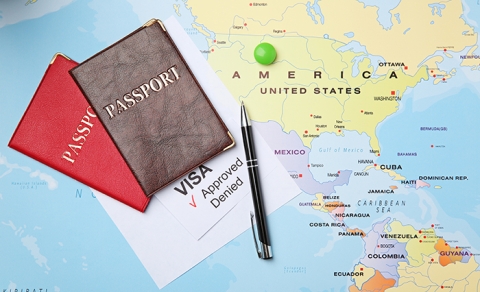Exhibitions & Conferences Alliance Takes a Stand as Staggering U.S. Visa Delays Deter International Event Delegates

According to new analysis released on Oct. 6 by U.S. Travel Association economists, the U.S. Department of State’s low prioritization of visitor visa processing is severely hindering the U.S. economic recovery, preventing an estimated 6.6 million potential visitors from traveling to the U.S. in 2023 at a loss of $11.6 billion in projected spending.
Wait times for visitor visa interviews now exceed 400 days for first-time applicants from top source markets, a huge deterrent that is sending millions of potential visitors – including business event delegates—and billions in traveler spending to other nations, according to U.S.Travel President and CEO Geoff Freeman.
“Excessive visa delays are essentially a travel ban—no one is going to wait 1-2 years to interview with a U.S. government official to gain permission to visit the United States,” Freeman said. “Our new research shows that millions of potential visitors will simply choose other destinations—destinations that effectively compete for their business.”
U.S. Travel has called on the State Department to make first-time visitor visa processing an economic priority and has shared several policy recommendations with the agency to help resolve this problem. Additionally, the organization’s urgent calls for a solution were echoed by more than 60 bipartisan members of Congress in a recent letter to Secretary of State Antony Blinken.
As the unified advocacy voice of the face-to-face business events industry, the Exhibitions & Conferences Alliance (ECA) isn’t sitting idly by as this urgent issue remains unresolved. Composed of 10 leading industry associations, ECA works at the local, state and federal levels to ensure that policymakers understand and support the critical role that the business events industry has on economic development, job creation, community impact and support for small businesses nationwide.
According to Tommy Goodwin, vice president of the ECA, the organization has been calling on the Biden Administration and the State Department to address the unacceptable delays that international attendees and exhibitors face in obtaining a visa to come to the U.S. for exhibitions and conferences—a glaring hindrance preventing the industry from returning to pre-pandemic economic levels.
TSNN had a chance to sit down with Goodwin to learn more about the current status of this pressing problem, how it’s impacting the event industry’s post-pandemic recovery and what business event professionals can do to support this crucial effort.
What is the current state of U.S. visitor visa wait times and how is it impacting the nation’s trade show and events industry? How did we get here exactly?
At this time, 40 countries participate in the Visa Waiver Program (VWP), which is administered by the Department of Homeland Security (DHS) in consultation with the State Department. The VWP allows citizens of those countries to travel to the U.S. for business or tourism for stays of up to 90 days without a visa.
For the top non-VWP countries (e.g., Mexico, Brazil, India), first-time applicants for B-1 and B-2 visitors visas currently face average interview wait times of more than 400 days, with the wait at some embassies and consulates exceeding two years. This is keeping countless exhibitors and attendees from coming back to business events in the U.S. at a time when the industry is still down 25.5% from 2019 levels, according to the Center for Exhibition Industry Research.
What has been stopping the U.S. State Department from shortening these wait times, and what needs to happen to fix this issue?
While the State Department has previously struggled with visa interview and processing delays at times, the size and scope of the current problem is unprecedented. While U.S. embassies and consulates around the world understandably stopped processing non-emergency visas during the height of the pandemic in 2020, many have been far too slow to restore capacity to pre-pandemic levels. This is hurting the economy, costing the U.S. billions of dollars in visitor spending and signaling to the world that the U.S. is closed for business.
In September, 55 members of the U.S. House of Representatives sent a letter to Secretary Antony Blinken calling on the State Department to take five steps to restore and improve visa processing:
- Prioritize resources to key markets including Mexico, Brazil and India.
- Lower wait times to 10-15 days in the top countries for inbound U.S. visitors.
- Develop a videoconference interview pilot program for low-risk visa applicants.
- Allow certain low-risk visa holders in the U.S. to renew without leaving the country first.
- Conduct group appointments for visa applicants looking to come to the U.S. for large exhibitions, conferences, meetings and events.
ECA wholeheartedly supports these recommendations, which will prioritize the reduction of visa interview and processing wait times without jeopardizing national security.
How is the ECA advocating for the industry when it comes to this issue, and what recent steps has it taken to inspire action from lawmakers on Capitol Hill?

The restoration of visa interview and processing capacity to pre-pandemic levels remains a top priority for ECA and the industry. As part of ECA’s ongoing advocacy work in Washington, D.C., we continue to meet with members of Congress and Biden Administration officials urging them to make reducing visa interview wait times a priority.
In addition, two members of the House of Representatives recently introduced the bipartisan Visitor Visa Wait Time Reduction Act, the first stand-alone piece of legislation that endeavors to address the extreme wait times for visitor visa appointments at U.S. diplomatic posts around the world. While the current challenges are largely ones of administrative capacity and prioritization, ECA supports the Visitor Visa Wait Time Reduction Act as well as various Congressional oversight efforts to spur much-needed and urgent action by the State Department.
What are the next steps, and when do you believe we will see movement on this issue?
Recently, the U.S. Travel Association called on the Biden Administration and State Department to set clear timelines and goals to restore efficient visa processing including:
- Lowering interview wait times for visitor visas to 21 days in Brazil, India and Mexico by April 2023.
- By Sept. 30, 2023, reinstating the Obama-era executive order to process 80% of visas worldwide within 21 days.
ECA supports those goals and echoes further calls for Congress to pass legislation that makes visa processing more modern and efficient.
What are some action steps event professionals can take to get behind this effort?
ECA continues to collect the stories of face-to-face business event organizers to share with policymakers that highlight the impact that failing to welcome back exhibitors and attendees has on our industry’s recovery. Additionally, along with our ongoing lobbying on this issue, ECA anticipates that visa interview wait times will be one of our top priorities for our grassroots advocacy efforts in 2023, including our annual ECA Legislative Action Day.
To learn more about the ECA’s advocacy efforts and resources and how to get involved, go here.
Don’t miss any event-related news: Sign up for our weekly e-newsletter HERE, listen to our latest podcast HERE and engage with us on Twitter, Facebook, LinkedIn and Instagram!


Add new comment